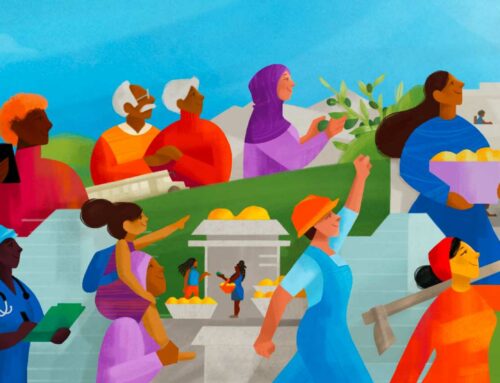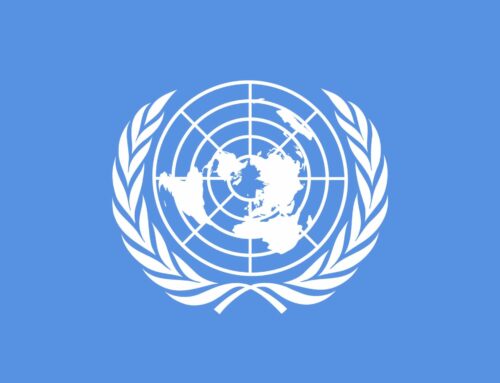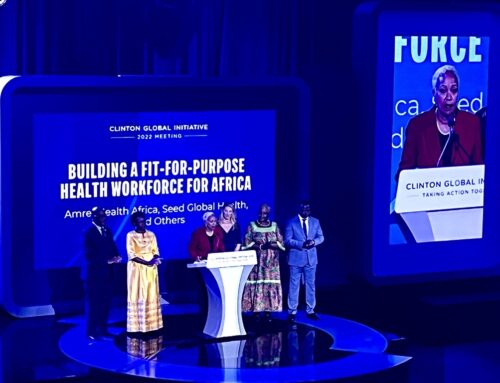COVID-19 Secondary Impacts: What they are, what we are doing about them, and how you can help this holiday season!

Today, mitigating the secondary effects of COVID-19 is an essential part of our programming across the African region. Below is just a small snapshot of these efforts. While COVID-19 continues to affect humanity globally, the secondary impacts are especially prevalent in Africa. Already affected by many inequalities, the pandemic has critically impacted many Africans’ overall health care and well-being. Lockdowns, closures, and the strain on already limited resources disrupted every aspect of daily life. Although mitigating the secondary impacts has been a challenge, we are addressing these issues by creating new ways to interact with the populations we serve and adapting existing programs to meet the emerging needs our communities face.
Women and Girls Safety
Called the “shadow pandemic,” quarantines and school closures meant spending more time at home, significantly increasing the risk of Gender-Based Violence (GBV). Over this pandemic, cases of GBV such as physical, sexual, verbal, emotional, and psychological abuse have risen drastically. This includes Female Genital Mutilation (FGM) and early marriage.
How Amref has helped:
- Ethiopia: Over 100 health care workers were trained on how to provide services to individuals who undergo physical and sexual assault and violence.
- South Sudan: We set up “One-Stop Centers” for women, youth, and people in farming communities to safely access sexual and reproductive health information and GBV services.
- Kenya: We provided girls with information, skills, and support networks through socially distanced mentorship home visit programs. And, to help girls keep up with schoolwork, we distributed desperately needed items like pads, masks, solar radios, and solar lights. 93% of our sponsored girls reported back to school, thanks to the support we were able to give throughout lockdown. For the other 7%, we will continue to work with the community to help find the best path forward. In addition, for the 300 girls in our scholarship program, mental health counseling was imbedded into the curriculum to discuss and process their fears and traumatic experiences they had during lockdown.
- Malawi: We created ‘safe spaces’ for adolescents, girls and young women to discuss GBV. These discussions included empowering them on how and where to report GBV.
Maternal and Child Health
While almost every country has experienced disruption to its health services since the start of the COVID-19 pandemic, countries across Africa have been severely impacted, particularly around maternal, neonatal, and child health care.
How Amref has helped:
- Ethiopia: We launched a new initiative for basic mobile phone users in rural villages. This application assists frontline health workers in following up with pregnant women and providing lifesaving pre-natal care, delivery, postnatal, and immunization services. This initiative also strengthens the referral system between the communities and bigger health facilities.
- Uganda: We trained over 600 midwives on how to respond to complications prior to, during, and following labor using our electronic-learning Midwives Upgrading platform. This allows nurses and midwives to study remotely via computers and at their own pace to develop specialized skills while continuing their vital work.
- Malawi: We upgraded 56 Nurse-Midwife Technicians to become Professional Registered Nurse-Midwives using a similar electric-learning platform.
- South Africa: We have launched a program aimed at increasing the uptake of neglected child immunizations.
Training Health Workers
With a high prevalence of health issues like malnutrition, malaria, and HIV in sub-Saharan Africa, the demand on health workers was already extensive – and COVID-19 only exacerbated it. A drastic increase in patients, and desperate need for supplies, oxygen, equipment, and PPE heavily impacted the mental health of our frontline health workers.
How Amref has helped:
- Multiple Countries*: We trained 111,694 healthcare workers around COVID-19 mitigation, distributed personal protective equipment to them, and ensured they had the proper resources and skills to manage their mental health needs. (*Kenya, Malawi, Rwanda, South Africa, South Sudan, Tanzania, Uganda, and Zambia.)
- Malawi: We procured and donated PPE to all the country’s health workers in partnership with the Ministry of Health to keep them safe.
- Kenya: We trained 50 young mothers from Dagoretti urban slum in mass production of PPE. These women are producing over 20,000 surgical masks and 100 medical gowns per month.
- Senegal and Guinea: We developed COVID-19 training modules in collaboration with the Ministry of Health using WhatsApp and mobile-health platforms for nurses, midwives, doctors, social workers, and specialists which includes a focus on keeping health workers safe in addition to patients.





